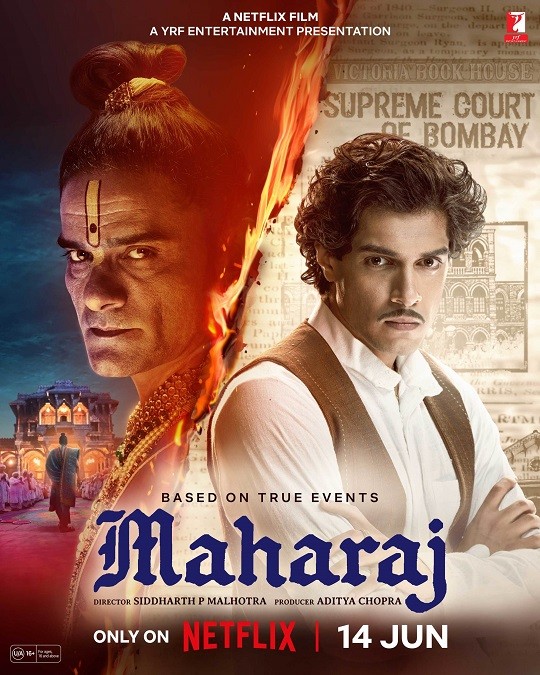Maharaj
Introduction
Can all the good work of a film with regard to its story be undone just by its weak screenplay and the tone of the drama? Yes! Finally, truth has prevailed and the delayed Netflix release Maharaj finally found the light of the day. But not before having its share of hiccups with a political group who demanded a ban on its release. There are two factions of the people currently – one who are liberal like me and don’t wish a ban on cinema even if it wouldn’t neccesarily align with my ideologies, and the other who are so sensitive folks who can get offended by the drop of a hat. So as long as things are going their way with a bunch of films catering their ‘quench’, there wouldn’t be even an iota of controversy. But the moment things start going South, they think that their ideologies and people are being targeted, only for them to demand a ban on the product. And so, credit where due to Netflix and YRF for coming up with this story based on the 1862 Maharaj Liber Case which can easily be relevant today if you are willing to read between the lines. But I was quite shattered with Maharaj, a film that I really wished to like but just couldn’t due to its weak screenplay and sub par execution. So then how does Maharaj fair overall, let’s find out.
Story & Screenplay
Based on a novel by the same name written by Saurabh Shah, Maharaj follows the story of a reformist Karsandas who questions a spiritual leader’s intentions and control of his followers. The story is layered, not only touching upon the heinous crime being committed by holy Godmen back in the day, but also questioning the blind faith that people have towards these people. And both these issues hold a position of relevancy even today with the rise of the undercurrents of power which are in play. But it is the screenplay standing at a shade above 2 hours which is so melodramatic and soapy that it doesn’t exactly have the kind of impact that it should have had otherwise. The need of the hour was to construct a drama on the lines of Bandaa which was restrained yet powerful with the intended message of the film. Alas, the drama here doesn’t hold ground the way I would have liked.
The drama seems outdated from the word go when a voiceover introduces the setup and a budding protagonist who is filled with a lot of questions. The voiceover itself could have been skipped by just introducing the viewers to the family and the important trait of the young protagonist of asking questions. Since the drama is set in the 19th century, you could see the sets depicting Bombay back in the day but even the sets felt a little less believable, almost instantly disconnecting me from the drama. So the world building itself seemed faulty, even as you are introduced to a bunch of characters around whom the conflict is set. This includes a Godman who chooses a girl for ‘Charan Seva’ ultimately leading to a face-off with the protagonist.
One of the biggest drawbacks of the writing was the pitch of the drama that felt too loud from the word go. While I did agree with the intended message of the makers, I couldn’t help but feel that the drama had a melodramatic and soap opera feel to it, with multiple characters frequently breaking into monologues. What that did was repeatedly highlight the underlying message of the film on what is right versus what is wrong instead of focusing on the story in itself. Even the subplots that included the undercurrents of tension between the protagonist and the Godman and his army was extremely lukewarm to a very large degree. The stakes in the drama didn’t feel that high, despite the death of a character which was partly shocking but lacked an emotional depth to truly connect with the proceedings. A budding love story in the middle of the drama being incorporated out of nowhere just didn’t help its cause at all.
The drama slightly picks up in its final act that featured a courtroom proceeding which was similar to Bandaa. And this was the major difference between Bandaa and Maharaj. The former had introduced the court proceedings early on in the film that continued up until the very end. In contrast, the court proceedings just did not have that impact as it ought to have had given that it was introduced only in the final act. With characters being introduced as late as the third act, and the eventual conclusion being simplistic and needless to say melodramatic, the screenplay does fall way short of having any sort of impact even with the relevancy that it holds today in the current setup.
Dialogues, Music & Direction
The dialogues are straight out of a soap opera that feel heavy and sleep inducing, instead of being nuanced and well directed. I did not mind the heaviness of the lines to creep in the final act but if the characters were being subjected to those lines consistently in the narrative, then it accounted for the drama to be verbose. The music and BGM are actually good and I liked how a little theme was used to portray the pain and agony of the characters at regular junctures in the screenplay. The cinematography is good atleast creating an ambience of the 19th Century rather well. I had a few editing issues at a few junctures in the drama but editing wasn’t really the main issue here, it was the writing and the execution. Director Siddharth P Malhotra misses the mark here with his direction. I think he failed to capitalize on the story while getting carried away with the intended message of the drama. This did reflect in the tone of the drama that was loud and melodramatic when in reality a subtle and nuanced approach was the way ahead. Even the staging of certain crucial sequences lacked an emotional outlook to them wherein you felt nothing related to the characters at all. So even the characterization(along with the world building) was faulty summing up a forgetable day for the director in office.
Performances
The performances are good although the characterization remains faulty. I don’t mean to single out a person but Junaid Khan has still a long way to go as an actor. While there are brief moments in which he does show some spark as Karsandas, largely the performance remains underpar and dare I say insipid wherein the intended emotions of his character do not reach the viewers. One reason for it could be his expressions, or the lack of it wherein he just turns up and mouths his dialogues instead of feeling them. He is clearly a work in progress and hope he gets better from this outing. Dharmendra Gohil as Tejpal, Viraf Patel as Sohrabji and Jay Upadhyay as Girish have their moments to shine but the one note of their characters doesn’t leave them enough scope to bloom. Shalini Pandey as Kishori is excellent and the innocence in her character is showcased pretty well. Sharvari is such a fine actor and she is absolutely brilliant here, getting the Gujarati accent spot on. Her expressions are on point and I really hope casting directors cast her more often, and that would help her to showcase her talent through frequent opportunities. Jaideep Ahlawat as JJ is amazing to the core with his calm demeanor as an exterior with a sinister motive within. His body language is spot on and it accounts for yet another memorable outing by him. All other characters are decent.
Conclusion
Maharaj is a well intended social drama packaged as a melodramatic soap opera that accounts for an insipid slugfest. I really wanted to like this film but alas, the screenplay and execution bring the film crashing down. Available on Netflix.





